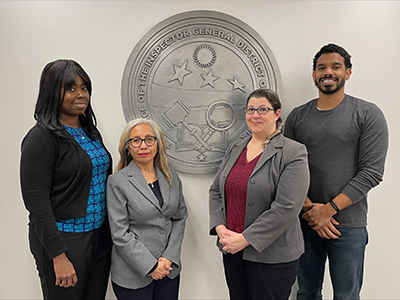OIG's Audit Unit Wins 2023 Knighton Award
The Office of the Inspector General's Audit Unit has won a 2023 Knighton Award from the Association of Local Government Auditors (ALGA). ALGA bestows the prestigious Knighton Award to acknowledge the top performance audit reports issued by its 300+ local government audit organization members. ALGA evaluates audit reports based on various criteria, including their potential for significant impact, the persuasiveness of their conclusions, a focus on improving government efficiency and effectiveness, as well as clarity and conciseness. Audit units from across the country compete against their peers of similar size for this highly sought-after award. OIG's Audit Unit received Distinguished recognition in ALGA's Large Audit Shop category for the Audit of the District of Columbia Agencies' Overtime Usage.
ALGA's Statement About the Audit
During the height of the COVID-19 pandemic, the delivery of District of Columbia (District) government services and programs to its residents was essential. Due to concerns about District municipal agencies' excessive reliance on overtime during the pandemic, the District’s Office of the Inspector General (OIG) conducted an audit of FY 2021 overtime management practices. The audit assessed:
- Overtime usage by District agencies, including increased spending;
- Adherence to District overtime policies; and
- The effects of overtime usage on District operations and employees.
The OIG audit examined nine District agencies whose cumulative overtime expenditure of $159 million contributed 85 percent of the total amount ($188 million) the District spent on overtime in FY 2021. The OIG audit team performed data analysis using statistical software tools and trend analyses and tested the design and function of internal controls.
The audit found that overtime use during FY 2021 subjected District agencies to spending pressures, health and safety risks, absenteeism, turnover, productivity decline, improper overtime payments, and inefficient and ineffective use of government resources.
FY 2021 Key Findings
- Annual compensation of 178 employees more than doubled due to overtime pay.
- Agencies cumulatively spent $31.5 million (53 percent) in excess of their overtime budgets.
- Overtime was not equitably distributed among eligible employees.
- Agencies did not always validate the necessity for overtime pay.
- One agency overpaid 520 employees $358 thousand, cumulatively, for overtime.
- The same agency underpaid 353 employees $105 thousand, cumulatively, for overtime.
- Two agencies incorrectly paid ineligible managerial employees $51 thousand, cumulatively, for overtime.
- Failure to monitor and limit overtime hours likely resulted in unproductive work for the District in the amount of $5.4 million.
What the Judges Said
"The audit subject was very relevant, with the potential to improve the District of Columbia’s management of overtime use and spending. The audit team did thorough work by completing a preliminary risk analysis that identified nine agencies with the highest overtime expenditures and analyzed the agencies’ overtime policies and budgets, as well as five years of overtime budget variance. The report identified significant control deficiencies and nonadherence to policies. The key information was presented in a well-organized manner so readers would not be overburdened by the 106 recommendations and the nine agencies’ responses. The auditors also made good use of the federal Green Book as an important criterion to evaluate the agencies’ design and implementation of control activities to ensure the management and oversight of overtime work and compensation comply with applicable overtime policies."
About the Audit Team
The OIG Audit Unit performed this audit with support from the OIG Risk Assessment and Future Planning Unit (RAFP). The team included Auditor-in-Charge Cynthia Williams; Audit Supervisors Robert Binelli, Erica Clarke, and Richard Sahadeo; Auditor Hoberlina Latupeirissa; and RAFP Data Scientist Aziza Talajawala. Mr. Binelli is a CPA, CISA, and CFE with 28 years of varied audit experience. Mr. Sahadeo, a CPA, CGFM, and CFE, and Ms. Clarke both have 15 years of public and government audit experience and have worked for the OIG for two years. Ms. Williams is a CISA and a CIGA with 15 years of audit experience with the OIG. Ms. Latupeirissa has worked as an auditor at the OIG for 12 years. The audit team leveraged the expertise of Ms. Talajawala, who has been a data scientist with the OIG for two years and has over five years of experience in data mining, statistical analysis, predictive modeling, causal analysis, and related domains.

Q&A with the Audit Team
What are you most proud of about this audit?
The audit team coordinated among nine District agencies with various overtime compensation criteria and controls. The DC OIG’s audit team obtained over 1 million unique payroll transactions for more than 42,000 employees over a three-year period. The OIG’s data scientist leveraged this data to conduct robust exploratory data analysis and mining, including unsupervised predictive analytics, Fast Fourier Transformation (FFT) analysis, and prescriptive analytics to assist the audit team with identifying higher-risk transactions and agencies. To form the report’s findings, the audit team aggregated the quantitative and qualitative overtime performance from the nine District agencies against a diverse set of criteria, including federal and District law, regulations, policies, procedures, collective bargaining agreements, external research from academia, and best practices from human capital management practitioners.
What is one thing you learned while working on this audit that you think would be valuable to ALGA members?
District employees qualified for overtime pay based on complex labor laws, regulations, multiple collective bargaining agreements, and court/mediator decisions. The team, with assistance from the District’s Office of the Attorney General and the OIG’s Office of General Counsel, learned to understand and apply the applicable payroll criteria correctly to help management reduce risks and correct control deficiencies. Further, given the audit’s scope covering the COVID-19 pandemic, the findings and recommendations can be instructive in preparing for and responding to future public emergencies.

